8 Homemade Coconut Oil Shampoo Recipes For Beautiful Hair
There is nothing better than enjoying the goodness of coconut oil now in your shampoo.

Image: shutterstock
Switching to natural hair care products is great for you and the environment. You can try one of the homemade coconut oil shampoo recipes from our list to pamper your hair within a budget. Coconut oil is rich in lauric acid (1). Its derivative, sodium lauryl sulfate, is a natural cleanser often found in commercially available shampoos. Coconut oil deeply nourishes your hair as it can penetrate the hair shaft. It keeps your hair strong, too (2).
Many traditional natural remedies and beauty treatments include combining coconut oil with various carrier oils, herbal extracts and essential oils for maximum hair benefits.
Hence, using coconut oil-based shampoos for hair is a good idea. Check out the recipes below and make your own DIY shampoo at home.
8 Homemade Coconut Oil Shampoo Recipes For Beautiful Hair
1. Easy Homemade Coconut Shampoo
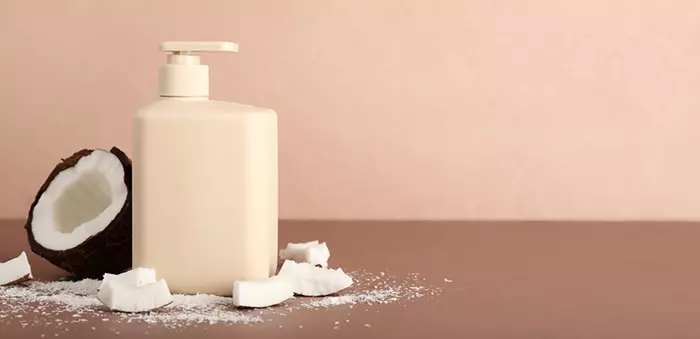
This is the easiest homemade coconut oil shampoo that can be quickly made by very few ingredients. It’s quick and hardly takes less than 5 minutes to make.
You Will Need
- ¾ cup water
- ½ cup castile soapi A highly effective and versatile soap made from olive oil without any animal fats or synthetic ingredients.
- 2 teaspoons table salt
- 2 tablespoons coconut oil
- 2 teaspoons jojoba oil
- 20 drops coconut fragrance oil
What You Need To Do
- Pour the water in a microwave-safe bowl and microwave for half a minute.
- Pour in the castile soap and blend gently without making too many suds.
- Add the salt and mix well.
- Finally, add the oils and stir until well incorporated.
- Store this in a squeeze bottle and use it as required.
 Quick Tip
Quick TipUse unrefined or extra virgin coconut oil in your homemade shampoo to nourish your hair.
2. Moisturizing pH-Balanced Shampoo
Hair fiber has a pH of 3.7, while the scalp has a pH of around 5.5. The pH of shampoos must be within this range (3). A study showed that nearly 68% of shampoos have a pH level greater than 5.5, which is not good for scalp health (4).
An imbalance in the pH levels can lead to either fungal or bacterial infections. Most hair care products contain alkaline chemicals. As a result, the pH levels increase, and the alkali in the shampoos reacts with the natural sebumi Oily, waxy substance produced by the sebaceous glands on the scalp that keeps your hair moisturized and healthy. that is acidic. Here’s how you can make a pH-balanced shampoo.
You Will Need
- 1 ½ cups coconut oil
- 1 ¾ cups aloe vera gel
- 20 drops of any fragrant essential oil
What You Need To Do
- Mix the oils and gel in a bowl with a wire whisk.
- Pour this into a jar and refrigerate.
The shampoo does not form soapy lather because it doesn’t have baking soda or liquid soap, both of which increase the alkalinityi The capacity, measure, or the ability of a substance to neutralize acidic substances or solutions. of the mixture. But it can be applied in the same way. The refrigerated mixture is great for hair clarifying and has a pudding-like consistency. Massaging your scalp with it removes the dirt and also improves blood circulation, which increases hair thickness. You can wash the shampoo away with water. If you feel your hair is greasy, wash it with a cup of apple cider vinegar.
3. Coconut And Honey Shampoo
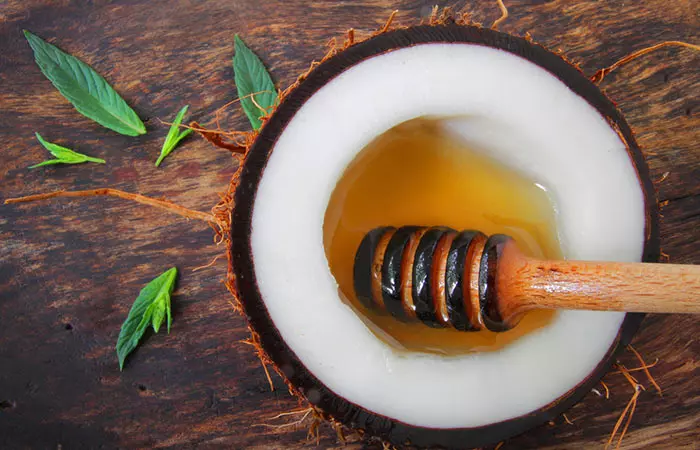
Even if you make your own shampoo with liquid soap, coconut oil, and fragrance, it still may not be better than store-bought shampoos that are full of chemicals. This is because the pH of the soap is quite high, and therefore, is still pretty harmful to the hair. To make a more balanced shampoo, you can use the following recipe.
You Will Need
- 1 cup coconut oil
- 1 cup aloe vera gel
- ¼ cup distilled water
- 2 tablespoons raw honey
- 1 teaspoon lavender essential oil
- 1 teaspoon rosemary essential oil
- ½ cup liquid castile soap (you can also omit this if you are okay with a lather-free shampoo)
- 1 teaspoon avocado oil (use if you have dry hair)
What You Need To Do
- Slowly stir the honey in lukewarm water until it is evenly mixed.
- Add the rest of the ingredients, barring the soap, and blend well.
- Stir in the soap but do not do it too much as that will form unnecessary suds.
- Pour this into a squeeze bottle and store in the freezer.
Shake the shampoo well before use, as the ingredients separate, which is normal. The shampoo lasts 2-3 weeks in the fridge, so store it in several small bottles. When you use a bottle, keep it in the fridge and store the rest in the freezer.
4. Coconut Oil Shampoo For Dandruff Problem
The use of coconut oil for dandruff has also been a popular choice lately. Coconut oil can penetrate the hair shaft and disintegrate the fungi, preventing dandruff and maintaining good scalp health. Coconut oil has antimicrobial and antifungal properties, which may help keep fungal infections and dandruff at bay (5), (6). The key to getting rid of dandruff is soothing the scalp using essential oils (7).
You Will Need
- ½ cup coconut milk
- 1 cup liquid soap
- ½ cup glycerine
- 4 teaspoons coconut oil
- 10 drops of essential oil (buy the therapeutic grade for best quality)
What You Need To Do
- Combine the coconut oil and glycerine in one bowl, and soap and milk in another.
- Slowly trickle in the oil mixture in the soap and milk mixture. Stir it to mix well.
- Add the essential oil and store it in a shampoo bottle.
Again, like the coconut and honey shampoo, this one also separates on sitting out for long. Shake it before using it. While you can skip the glycerine in the recipe, it’s always better to keep it as the glycerine gives the shampoo a thicker consistency. It also makes the hair much softer and offers frizz control and easier hair-detangling. However, you can skip it if it makes your hair sticky.
Bergit Kerr, a blogger, shared her journey transitioning to natural and homemade beauty products, particularly focusing on her experience with a coconut milk shampoo and clarifying rinse. Before that, she struggled with scalp eczema that the commercial shampoos failed to provide relief for. Three weeks after using her homemade shampoo, she wrote, “Within just a few washes, my scalp felt significantly more healed of the sores…My hair has acquired that certain shine and extra luster that I had been missing for a while (i)!”
5. Coconut Milk Shampoo
Coconut milk contains plenty of healthy proteins and nutrients (8). These nourish the hair and give them a luscious texture.
You Will Need
- 1 cup coconut milk
- 1/3 cup olive oil
- Hot water
What You Need To Do
- Mix the oil and the milk.
- Massage the mixture onto your scalp for a few minutes and leave it for better absorption.
- It creates a sticky, mask-like layer. Rinse it with hot water. It cleans the scalp very well and removes dirt, excess sebum, and dandruff.
 Quick Tip
Quick Tip6. Dry Coconut Shampoo

Sometimes, transitioning from work to party means spending a precious hour on shampooing, blow-drying, and hair styling. These are the times when you need a hassle-free dry shampoo. However, dry shampoo also contains lots of chemicals. If you want a nourishing shampoo, it is best to switch to your own DIY dry coconut shampoo.
You Will Need
- 4 tablespoons organic cinnamon bark powder
- 2 tablespoons cornstarch
- 1 tablespoon coconut milk powder
- 1 tablespoon finely powdered oatmeal
- 10 drops of lavender oil (or an essential oil of your choice)
What You Need To Do
- Combine the powders with a whisk.
- Add the essential oil and mix.
- Use a large makeup (blush) brush and dust your hair and scalp with the powder.
- Comb your hair to get rid of excess powder.
The cinnamon and the coconut milk powder act as a conditioner, so the result is thick, shiny hair that smells heavenly.
7. Coconut Shampoo And Conditioner Combo
Coconut oil is really good for your hair texture.
You Will Need
- 1 cup Dr. Bronner Castile soap (it contains organic oils and vitamin E and is natural)
- 3/4 cup coconut oil
- 20 drops of coconut fragrance
- 10 drops of vanilla extract
What You Need To Do
- Mix the oil and soap gently to prevent lathering.
- Add the fragrance and extract to add a nutty and exotic fragrance to your shampoo.
- Store in the fridge in an old, empty shampoo bottle. It lasts for a month.
8. Coconut Deep Conditioner For Curls
Frizzy hair is a constant annoyance if you have curly hair and live somewhere humid. Your hair fluffs up and is extremely dry and rough to the touch. This is exactly where using coconut oil for curly hair can help. This type of hair requires deep conditioning at least once a week.
You Will Need
- ¼ cup coconut milk
- 2 tablespoons coconut oil
- 2 tablespoons raw honey
- 1 tablespoon Greek yogurt
- 5 drops of lavender essential oil
What You Need To Do
- Mix the milk, oil, honey, and yogurt in a blender until a smooth viscous cream is obtained.
- Add the essential oil and fold through the cream.
- Part your hair into sections and dab some of the conditioner onto your hair.
- When the entire hair is covered, comb it through.
- Let this sit for nearly an hour. After that, shower as normal.
Hair sprays have become a hair care and styling staple these days but most commercial sprays are full of chemicals. Hence, you can make this easy DIY coconut oil hairspray for frizzy hair at home.
Key Takeaways
- Refrigerated coconut oil shampoo made with aloe vera and essential oils helps balance the pH of the scalp and treats dandruff.
- A mixture of coconut oil, coconut milk, honey, Greek yogurt, and lavender essential oil can be used as a conditioner for extremely curly hair.
- The cooling properties of coconut oil allow coconut oil shampoo to reduce sweating and dandruff.
- Coconut oil spreads along the hair quickly and acts as a styling cream and gel.
Coconut Hair Spray
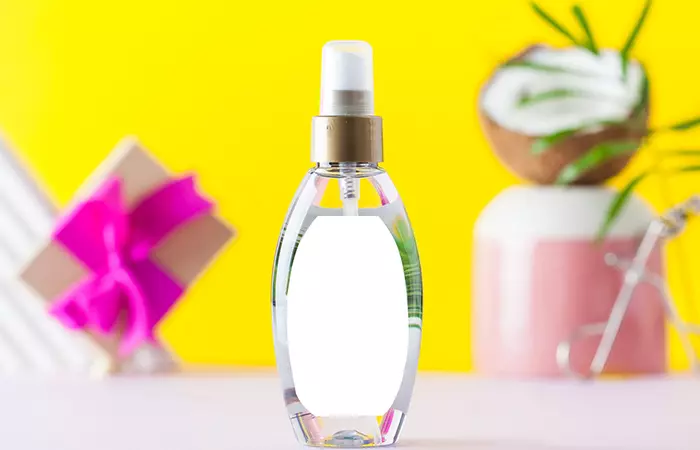
You Will Need
- 1/4 cup coconut oil
- 2 cups distilled water
- 5 drops of coconut fragrance
What You Need To Do
- Use a hand blender to combine the coconut oil and water in an emulsion.
- Once the emulsion is formed, stir the coconut fragrance and store it in an aerosol bottle.
- Shake well before using, in case the emulsion has separated. Spray lightly onto frizzy hair for best results.
Now that you know how to make your own coconut oil spray, scroll down to the next section to see how coconut oil improves your overall hair health.
Benefits
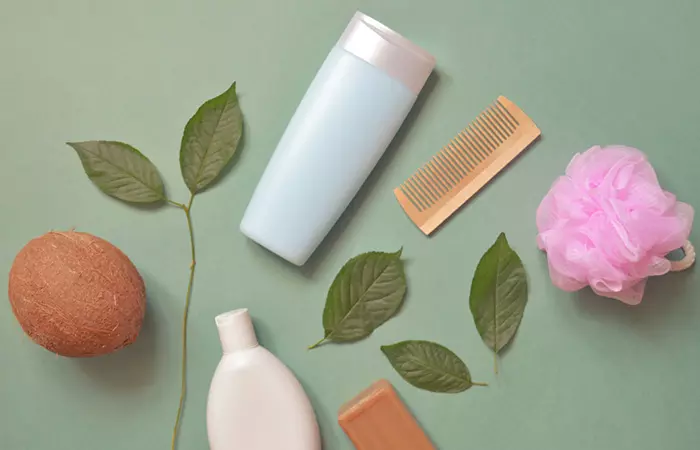
There are various benefits of coconut oil, such as:
- It reduces hair loss. It has been used as a hair loss treatment in India for centuries. It improves the quality of hair and strengthens the roots.
- It helps in cooling down the scalp. If the scalp sweats too much, the sweat and the sebum clump together with dandruff and dirt to form a thick, smelly layer of debris on the scalp. This damages the hair and prevents the natural oils from reaching the tip of the hair. As a result, you have dull, undernourished hair. Coconut oil shampoo reduces sweating and also helps in getting rid of dandruff.
- Coconut oil helps in retaining moisture. If you live in a hot climate, the moisture in your hair evaporates easily. Dry, frizzy hair is very normal in these conditions. Using coconut oil prevents this.
- Coconut oil is a better conditioner than most of the chemical ones available from high-end hair care brands (9). Coconut oil keeps your hair shiny and soft throughout the day and even later.
- Most of the anti-dandruff shampoos contain coconut oil for a reason. Coconut oil massages treat dandruff and also keep it at bay.
- Coconut oil melts on heating and solidifies when cold. As a result, it makes styling the hair much easier. When you massage it on the scalp, your body heat melts it and helps it spread quickly. When rubbed on the hair, it becomes more viscous and acts like a styling cream or gel.
- It protects the hair from lice infestation. The lice treatment formulas contain harsh chemicals that may damage the hair. Using coconut oil smoothes the hair, so that the consequent combing for nits and lice becomes easier.
- During winter, some people get boils on their scalp. This can also happen when staying out for long hours in the sun. Massaging with coconut oil prevents the formation of these boils.
- Split ends decelerate hair growth. Hence, you need to trim them regularly. Regular application of coconut oil can help prevent split ends altogether.
- Coconut oil also prevents premature hair graying.
- The high lauric acid content in coconut oil may help reduce protein loss, leading to healthier hair (2).
- Coconut oil has a sun protection factor of 8, which may protect your hair from UV rays and sun damage (10), (11).
- Applying coconut oil before washing your hair may reduce the amount of water absorbed by your hair, making it less prone to damage when it is wet.
- Coconut oil also helps add shine to your hair (12).
Infographic: 8 Benefits Of Homemade Coconut Oil Shampoo
Homemade coconut oil shampoos are beneficial natural alternatives to commercial hair care products, especially for your hair and scalp. Incorporating some simple ingredients into your hair care routine can not only nourish your tresses but also make them healthier. Check out the below infographic for the benefits of using a coconut oil shampoo.

Illustration: StyleCraze Design Team
We all know how beneficial coconut oil is for the scalp and hair. But its use as a shampoo might surprise many. Coconut oil strengthens the hair roots and offers breakage prevention, shedding prevention, and hair rejuvenation. It, retains moisture in the hair strands, cools and conditions the scalp, and provides many additional benefits. These homemade coconut oil shampoos moisturize the hair, maintain a healthy pH level, provide antifungal and antimicrobial properties to protect the scalp and hair from infections, nourish the hair and scalp, and improve hair texture. In addition, using the deep conditioning coconut oil treatment for curls helps reduce frizz.
Frequently Asked Questions
Can coconut oil damage your hair?
No. Coconut oil can not damage your hair. However, excessive use of oils on the hair can lead to product buildup on the scalp, clog the follicles, and lead to hair fall.
What should I mix with coconut oil for my hair?
Using coconut oil by itself on your hair will have plenty of benefits. However, you may also mix it with other hair oils, apple cider vinegar, honey, essential oils, hibiscus powder, and many other ingredients to make a mask for added benefits.
Is homemade shampoo better for your hair?
Yes. Homemade shampoos may work efficiently on your hair. Moreover, they are cost-effective and good for the environment.
Illustration: Homemade Coconut Oil Shampoo Recipes For Beautiful Hair
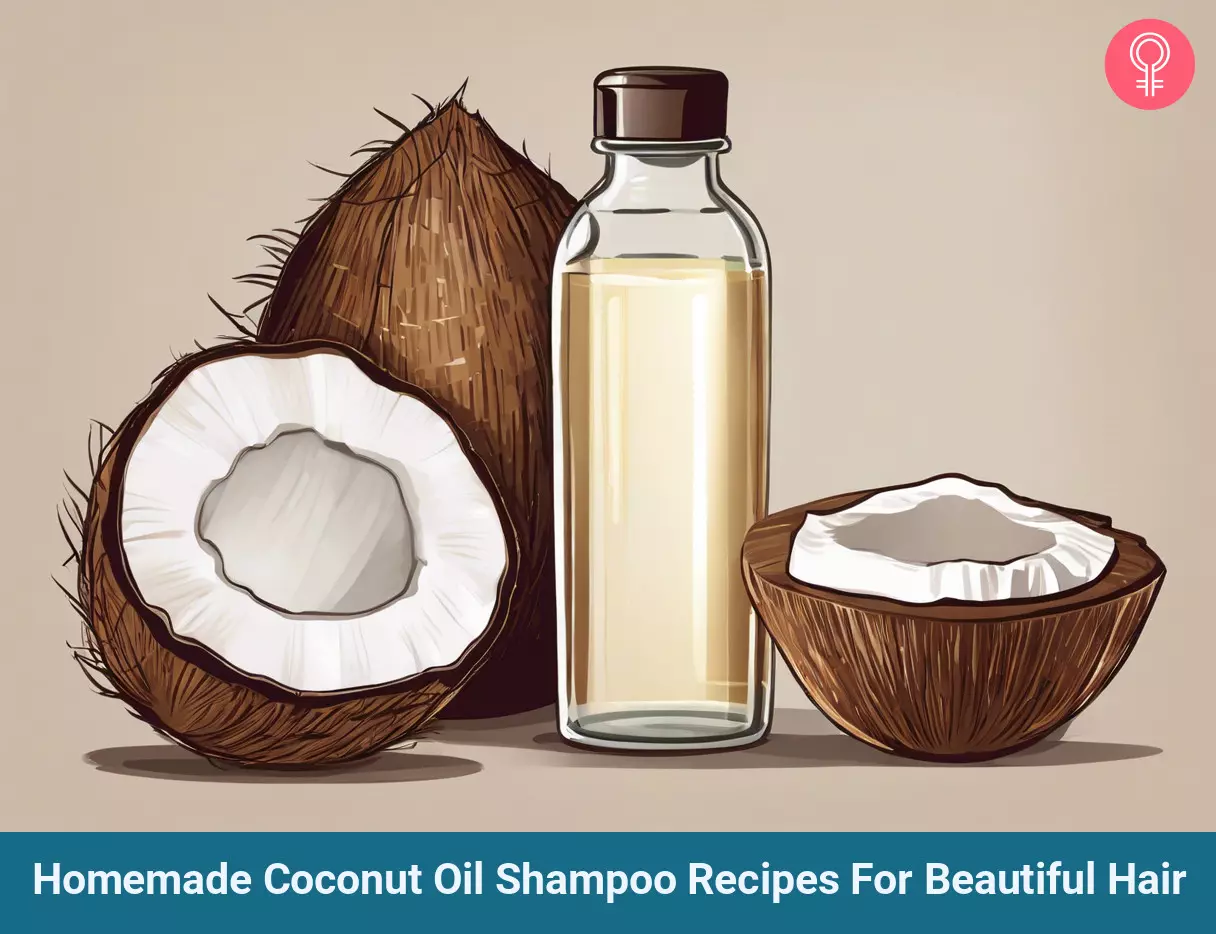
Image: Stable Diffusion/StyleCraze Design Team
Say goodbye to dry and frizzy hair with a homemade natural coconut shampoo. Watch this video to learn the process of creating a nourishing, chemical-free solution for luscious, healthy locks.
Personal Experience: Source
StyleCraze's articles are interwoven with authentic personal narratives that provide depth and resonance to our content. Below are the sources of the personal accounts referenced in this article.
i. Homemade coconut milk shampoo and clarifying rinse,https://birgitkerr.blogspot.com/2013/05/homemade-coconut-milk-shampoo-and.html
References
Articles on StyleCraze are backed by verified information from peer-reviewed and academic research papers, reputed organizations, research institutions, and medical associations to ensure accuracy and relevance. Read our editorial policy to learn more.
- Wallace, Taylor C. “Health Effects of Coconut Oil-A Narrative Review of Current Evidence.” Journal of the American College of Nutrition 38,2 (2019): 97-107.
https://pubmed.ncbi.nlm.nih.gov/30395784/ - Rele, Aarti S, and R B Mohile. “Effect of mineral oil, sunflower oil, and coconut oil on prevention of hair damage.” Journal of cosmetic science 54,2 (2003): 175-92.
https://pubmed.ncbi.nlm.nih.gov/12715094/ - D’Souza, Paschal, and Sanjay K Rathi. “Shampoo and Conditioners: What a Dermatologist Should Know?.” Indian journal of dermatology 60,3 (2015): 248-54.
https://www.ncbi.nlm.nih.gov/pmc/articles/PMC4458934/ - Gavazzoni Dias, Maria Fernanda Reis et al. “The Shampoo pH can Affect the Hair: Myth or Reality?.” International journal of trichology 6,3 (2014): 95-9.
https://www.ncbi.nlm.nih.gov/pmc/articles/PMC4158629/ - Ogbolu, D O et al. “In vitro antimicrobial properties of coconut oil on Candida species in Ibadan, Nigeria.” Journal of medicinal food 10,2 (2007): 384-7.
https://pubmed.ncbi.nlm.nih.gov/17651080/ - Shilling, Michael et al. “Antimicrobial effects of virgin coconut oil and its medium-chain fatty acids on Clostridium difficile.” Journal of medicinal food 16,12 (2013): 1079-85.
https://pubmed.ncbi.nlm.nih.gov/24328700/ - Ali, Babar, et al. “Essential Oils Used in Aromatherapy: A Systemic Review.” Asian Pacific Journal of Tropical Biomedicine, 10 July 2015.
https://www.sciencedirect.com/science/article/pii/S2221169115001033 - Patil, Umesh & Benjakul, Soottawat. (2018). Coconut Milk and Coconut Oil: Their Manufacture Associated with Protein Functionality. Journal of Food Science.
https://www.researchgate.net/publication/326382413_Coconut_Milk_and_Coconut_Oil_Their_Manufacture_Associated_with_Protein_Functionality - Rele, A S and R B Mohile. “Effect of coconut oil on prevention of hair damage. Part I.” (1999).
https://www.semanticscholar.org/paper/Effect-of-coconut-oil-on-prevention-of-hair-damage.-Rele-Mohile/37f3706f326b55bfc3e2a346ac48f8f0a9755b7d?p2df - Cefali, Ataide, et al. “Plant-based active photoprotectants for sunscreens.” International Journal of Cosmetic Science, 26 February, 2016.
https://onlinelibrary.wiley.com/doi/full/10.1111/ics.12316 - Gause and Chauhan. “UV-blocking potential of oils and juices.” International Journal of Cosmetic Science, 29 January, 2016.
https://pubmed.ncbi.nlm.nih.gov/26610885/ - Vala. “Medicinal benefit of coconut oil.” International Journal of Life Sciences Research December 2019.
https://www.researchgate.net/publication/268805677_Medicinal_benefit_of_coconut_oil
Read full bio of Dr. Meena Konada
Read full bio of Anjali Sayee
Read full bio of Ramona Sinha
Read full bio of Krati Darak






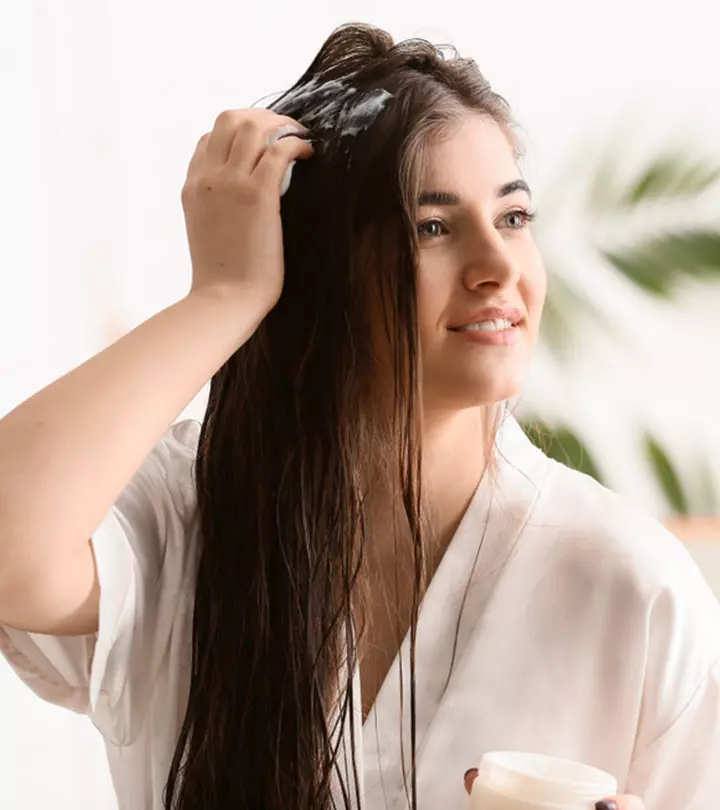

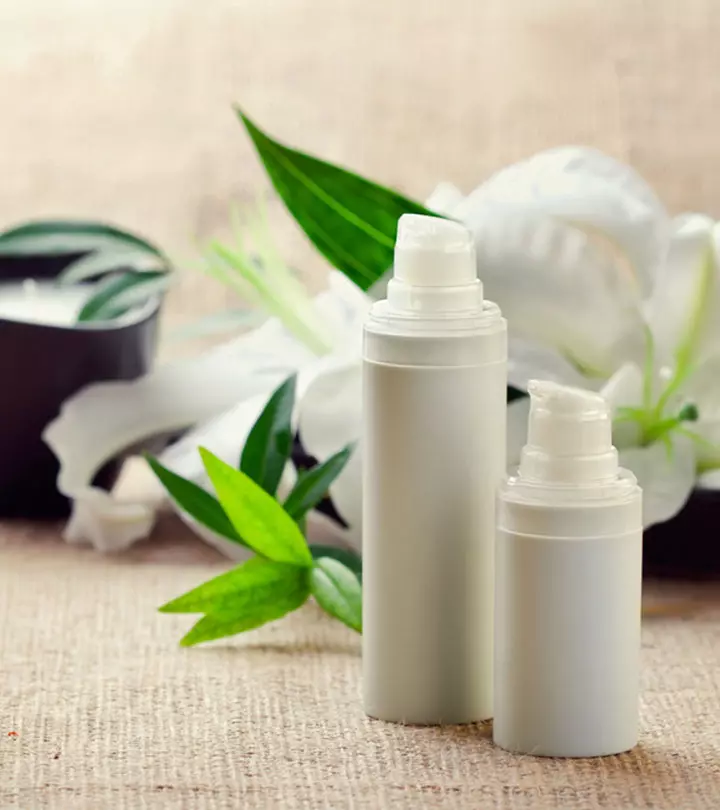
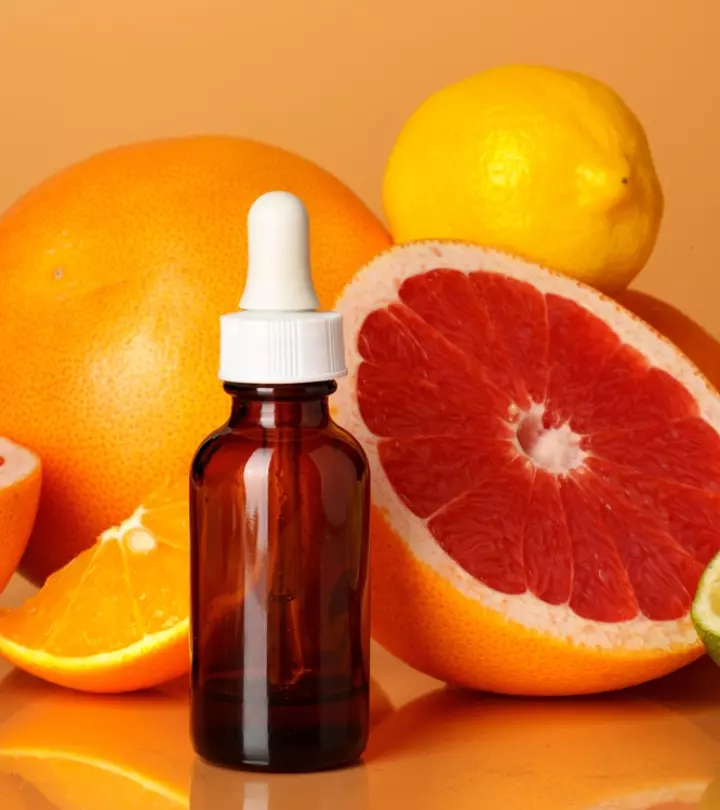
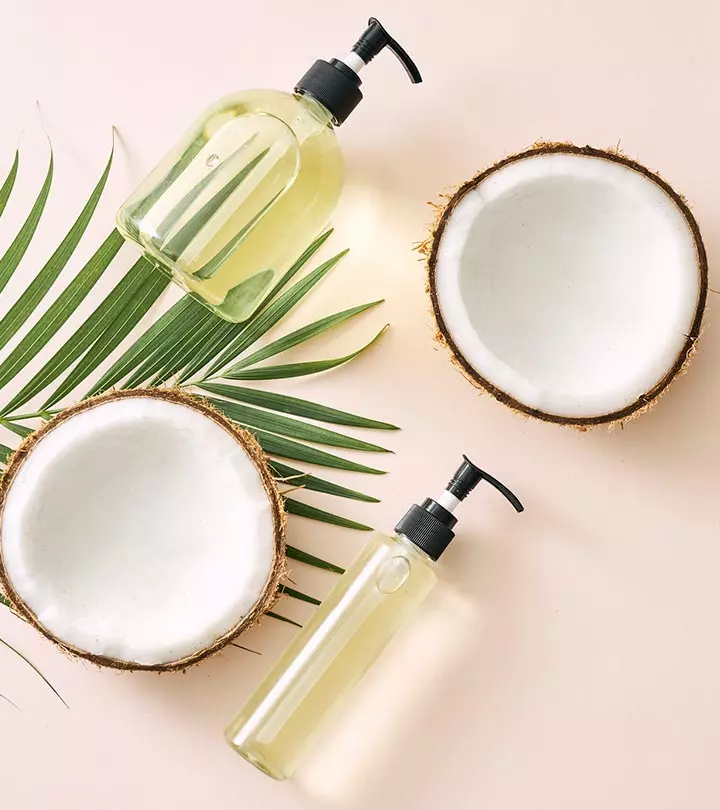
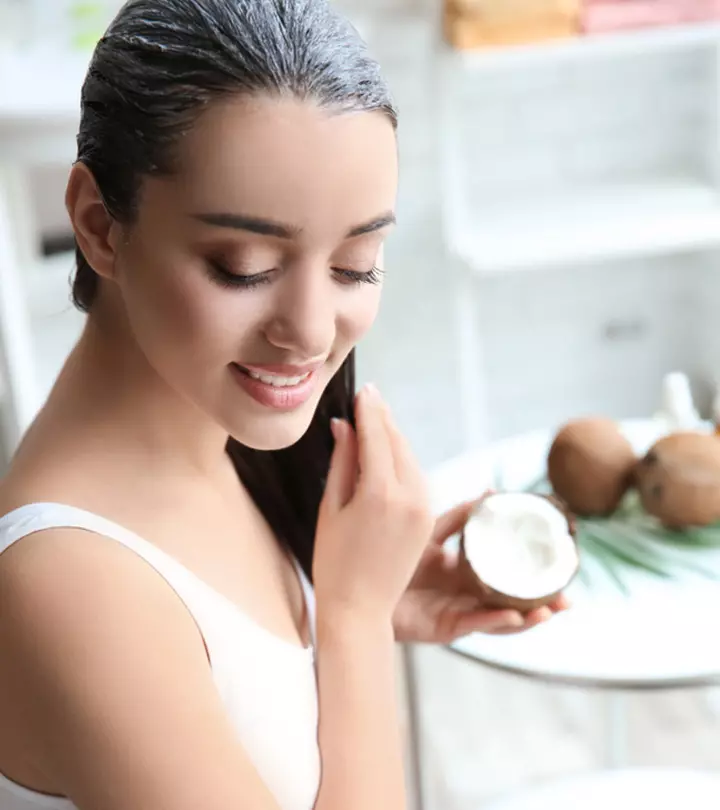
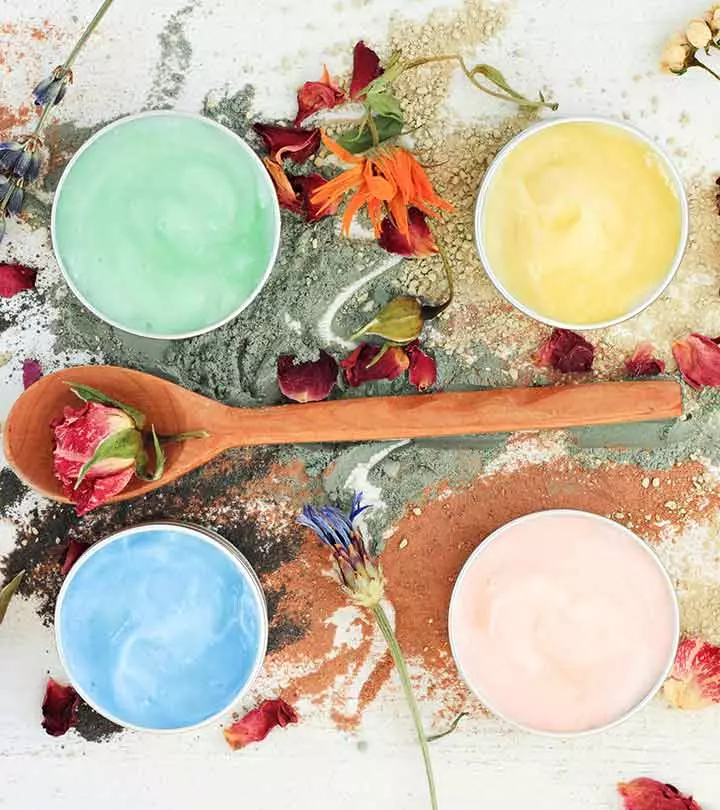
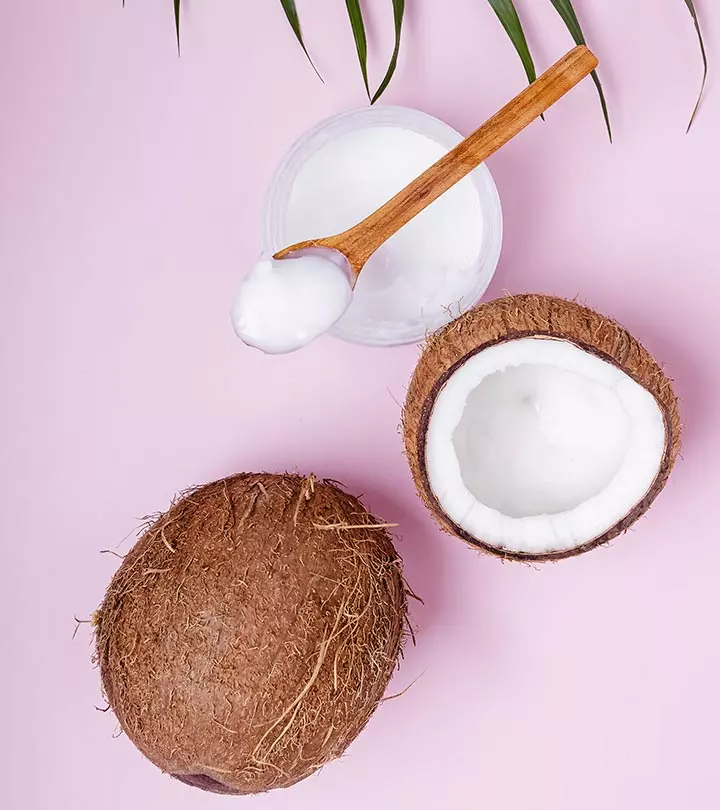
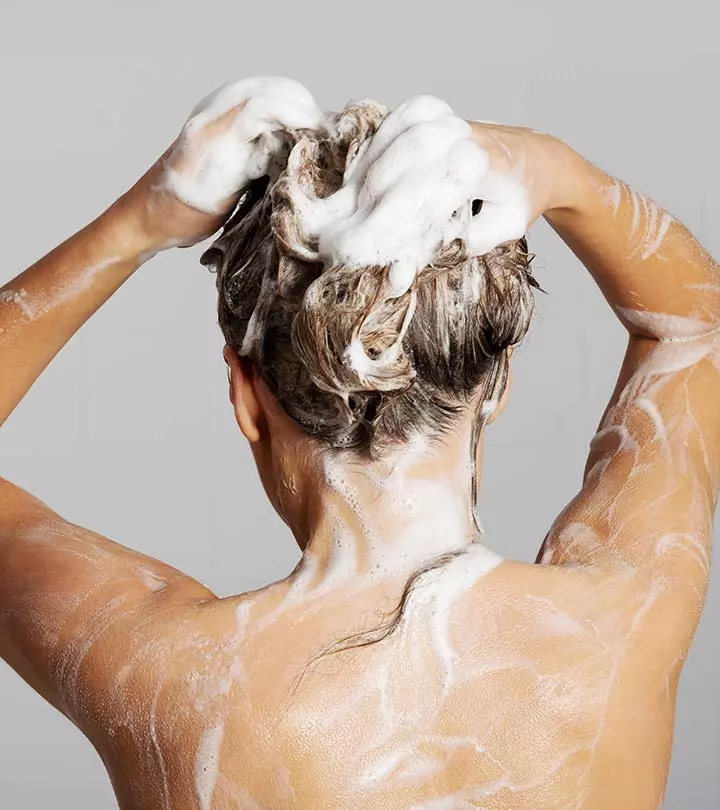



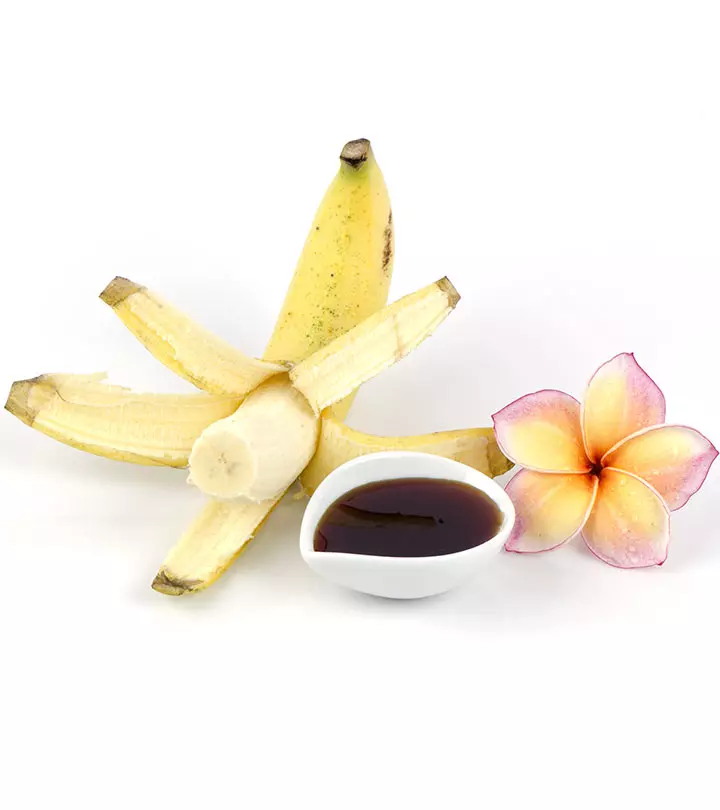

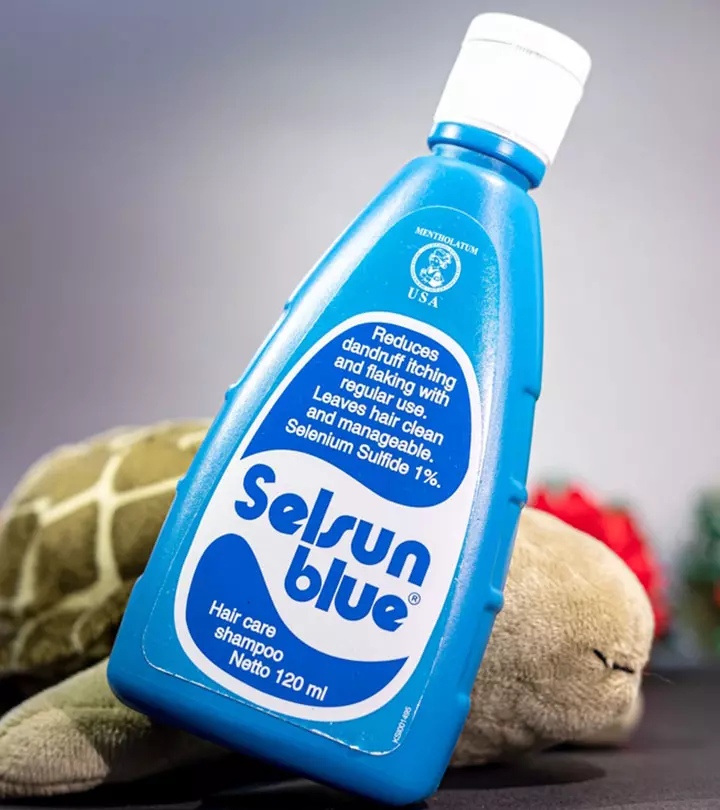

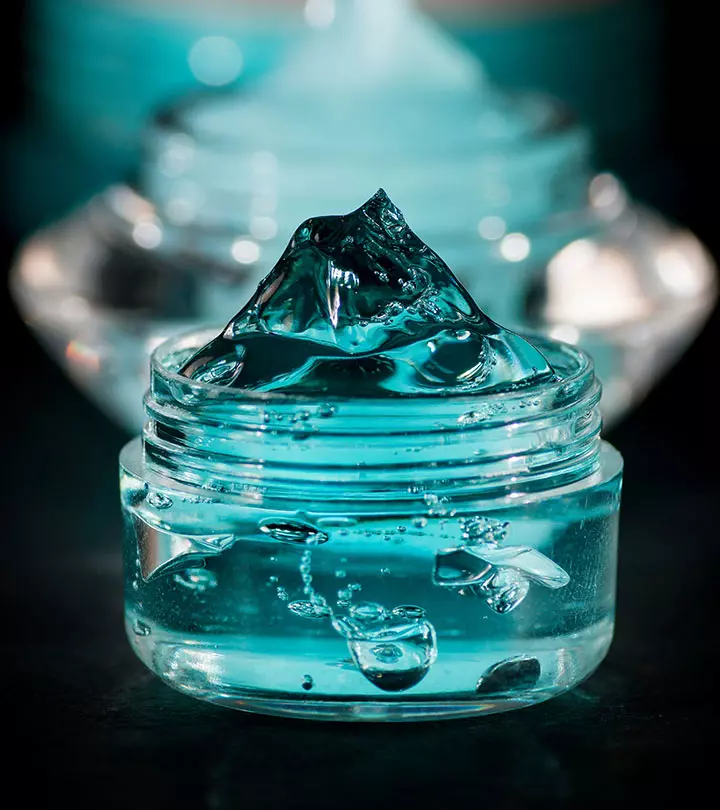

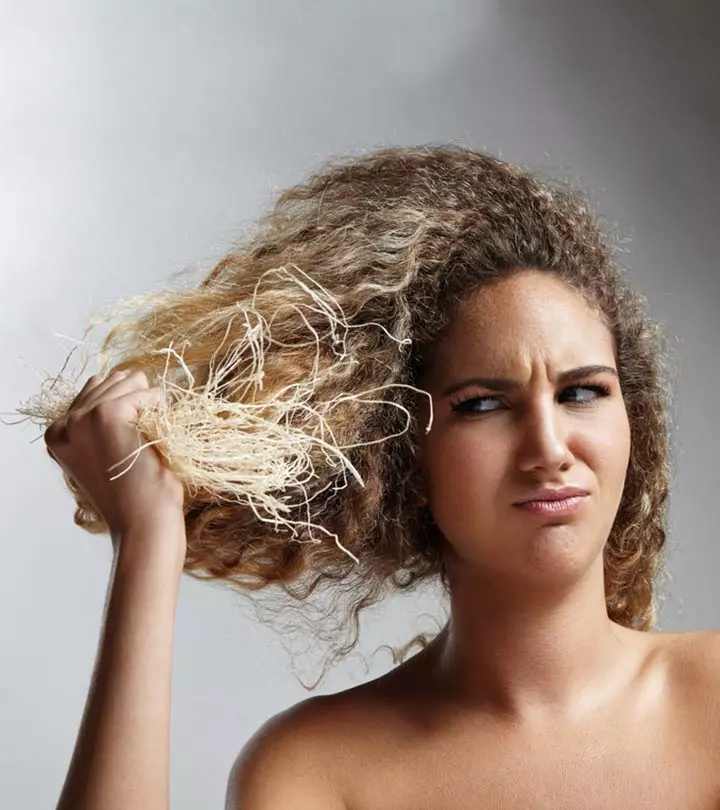

Community Experiences
Join the conversation and become a part of our empowering community! Share your stories, experiences, and insights to connect with other beauty, lifestyle, and health enthusiasts.